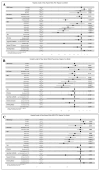Association of ABO and Rhesus blood groups with severe outcomes from non-SARS-CoV-2 respiratory infection: A prospective observational cohort study in Bristol, UK 2020-2022
- PMID: 38009561
- PMCID: PMC7616671
- DOI: 10.1111/bjh.19234
Association of ABO and Rhesus blood groups with severe outcomes from non-SARS-CoV-2 respiratory infection: A prospective observational cohort study in Bristol, UK 2020-2022
Abstract
Despite significant global morbidity associated with respiratory infection, there is a paucity of data examining the association between severity of non-SARS-CoV-2 respiratory infection and blood group. We analysed a prospective cohort of adults hospitalised in Bristol, UK, from 1 August 2020 to 31 July 2022, including patients with acute respiratory infection (pneumonia [n = 1934] and non-pneumonic lower respiratory tract infection [NP-LRTI] [n = 1184]), a negative SARS-CoV-2 test and known blood group status. The likelihood of cardiovascular complication, survival and hospital admission length was assessed using regression models with group O and RhD-negative status as reference groups. Group A and RhD-positive were over-represented in both pneumonia and NP-LRTI compared to a first-time donor population (p < 0.05 in all); contrastingly, group O was under-represented. ABO group did not influence cardiovascular complication risk; however, RhD-positive patients with pneumonia had a reduced odds ratio (OR) for cardiovascular complications (OR = 0.77 [95% CI = 0.59-0.98]). Compared to group O, group A individuals with NP-LRTI were more likely to be discharged within 60 days (hazard ratio [HR] = 1.17 [95% CI = 1.03-1.33]), while group B with pneumonia was less likely (HR = 0.8 [95% CI = 0.66-0.96]). This analysis provides some evidence that blood group status may influence clinical outcome following respiratory infection, with group A having increased risk of hospitalisation and RhD-positive patients having reduced cardiovascular complications.
Keywords: blood group; pneumonia; respiratory infection.
© 2023 The Authors. British Journal of Haematology published by British Society for Haematology and John Wiley & Sons Ltd.
Conflict of interest statement
CH is Principal Investigator of the AvonCAP study which is an investigator-led University of Bristol study funded by Pfizer and has previously received support from the NIHR in an Academic Clinical Fellowship. JO is a Co-Investigator on the AvonCAP Study. LD is further supported by UKRI through the JUNIPER consortium (grant number MR/V038613/1), MRC (grant number MC/PC/19067), EPSRC (EP/V051555/1 and The Alan Turing Institute, grant EP/N510129/1). AF is a member of the UK Joint Committee on Vaccination and Immunization (JCVI) and chair of the World Health Organization European Technical Advisory Group of Experts on Immunization (ETAGE) committee. In addition to receiving funding from Pfizer as Chief Investigator of this study, he leads another project investigating transmission of respiratory bacteria in families jointly funded by Pfizer and the Gates Foundation and is an investigator in trials of COVID-19 vaccines including ChAdOx1nCOV-19, Janssen and Valneva vaccines. The other authors have no relevant conflicts of interest to declare. The AvonCAP study is a University of Bristol sponsored study which is investigator-led and funded under a collaborative agreement by Pfizer Inc.
Figures





References
-
- Cohen S. Social Status and Susceptibility to Respiratory Infections. Ann N Y Acad Sci. 1999;896:246–253. - PubMed
-
- National Center for Chronic Disease Prevention and Health Promotion (US) Office on Smoking and Health. The Health Consequences of Smoking—50 Years of Progress: A Report of the Surgeon General. Centers for Disease Control and Prevention (US); 2014. Advances in Knowledge of the Health Consequences of Smoking: From 1964–2014. - PubMed
-
- Aleem MS, Sexton R, Akella J. StatPearls. StatPearls Publishing; 2022. Pneumonia In An Immunocompromised Patient. [Internet]
-
- Anstee DJ. The relationship between blood groups and disease. 2010;115 - PubMed
Publication types
MeSH terms
Substances
Grants and funding
LinkOut - more resources
Full Text Sources
Medical
Miscellaneous

